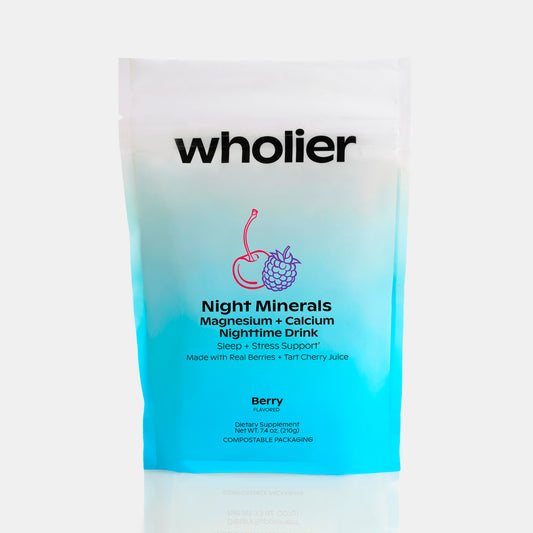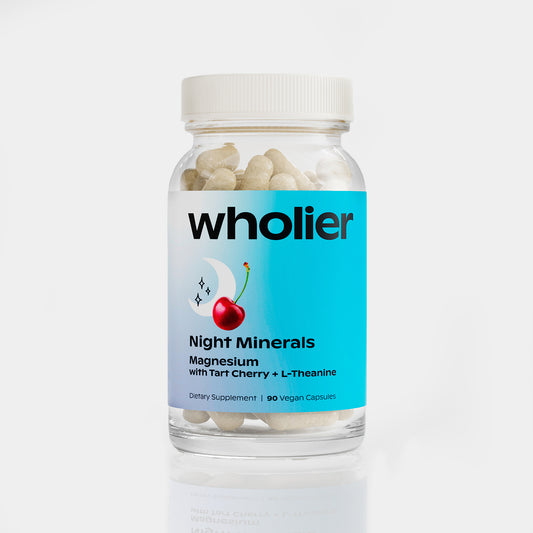
Magnesium Carbonate vs. Citrate – Which is the Better Form?
The buzz around magnesium isn't without reason. Known as a jack-of-all-trades mineral, magnesium is involved in over 300 biochemical reactions in our bodies, playing roles from bone health to energy production.(1) But the world of magnesium isn't one-size-fits-all. Let's delve into two popular types of magnesium supplements—magnesium carbonate and magnesium citrate—and uncover which one might suit you best.(2)
What’s The Deal With Magnesium Carbonate?
Magnesium carbonate, commonly known as magnesite, is a naturally occurring mineral. It's not just a mineral supplement, but it's also found in antacids, thanks to its ability to neutralize stomach acid.(3) For those targeting bone health, this could be your match. According to a study published in the American Journal of Clinical Nutrition, magnesium carbonate supplementation improved bone mineral density in postmenopausal women.(4) So, if you're trying to build those bones up, magnesium carbonate may be a solid contender.(5)
But the benefits don't stop at bone health. Because of its antacid properties, magnesium carbonate can help ease symptoms of indigestion and heartburn, making it a possible ally for those with upset stomachs.(6) However, remember that long-term use of magnesium-based antacids could lead to diarrhea due to the laxative effect of magnesium.(7)
What About Magnesium Citrate?
Switching gears, let's look at magnesium citrate, a salt of magnesium and citric acid. Known for its role in bowel regularity, it's a go-to for those dealing with constipation.(8)
The European Journal of Clinical Nutrition published a study stating that magnesium citrate has a laxative effect, as it can attract water into the intestines, which helps stimulate bowel movements.(9) It's worth noting, though, that excessive use of magnesium citrate may lead to an electrolyte imbalance, so always remember to stick to the recommended dosage.(10)
How Do They Compare In Bioavailability?
Bioavailability, a term that describes the amount of an ingested nutrient that your body can absorb and utilize, is a crucial factor when choosing a supplement.(11) Here, magnesium citrate has shown to be better than magnesium carbonate.
Research in Magnesium Research indicated that the bioavailability of magnesium citrate was significantly higher than other forms of magnesium, meaning that it's more readily absorbed and used by the body.(12) Although research on magnesium carbonate's bioavailability is less abundant, it's generally considered to be less bioavailable than magnesium citrate.(13)
How Do Magnesium Carbonate and Citrate Supplements Impact Digestion?
As we've discussed, magnesium citrate can act as a laxative, making it a popular choice for people dealing with constipation or preparing for colonoscopies.(13) This is due to its ability to draw water into the intestines, which can stimulate bowel movements.(14)
On the other hand, magnesium carbonate acts as an antacid. It neutralizes stomach acid, helping to alleviate symptoms of indigestion and heartburn.(15) It's worth mentioning, however, that long-term use of magnesium-based antacids can lead to diarrhea due to the laxative effect of magnesium.(16)
Are There Any Side Effects To Be Aware Of?
With all supplements, it's important to be aware of potential side effects. For magnesium carbonate, side effects are rare but can include stomach upset, nausea, vomiting or diarrhea.(17) Remember, it can act as a laxative when taken in larger doses.(18)
For magnesium citrate, side effects can include diarrhea, nausea, abdominal cramping, and bloating.(19) It's worth noting that excessive use of magnesium citrate can lead to an electrolyte imbalance, so it's always important to stick to the recommended dosage.(20)
What's the Bottom Line?
Magnesium supplements can play an important role in maintaining overall health. When choosing a magnesium supplement, it's crucial to consider the bioavailability of each form. As it relates to these two forms, citrate is generally thought to be more readily absorbed by the body.(21) Thus, it's likely a better choice. This is why it's one of the two bioavailable forms of magnesium used in our Night Minerals Magnesium + Calcium Drink. Your journey to optimal health is a personal one, so take the time to research and choose what's best for your unique needs. After all, you're worth it!
Sources:
(1) Serefko, Anna, et al. "Magnesium and depression." Magnesium Research 29.3 (2016): 112-119.
(2) Office of Dietary Supplements - Magnesium. NIH Office of Dietary Supplements, U.S. Department of Health and Human Services, ods.od.nih.gov/factsheets/Magnesium-HealthProfessional/.
(3) Coudray, Charles, et al. "Study of magnesium bioavailability from ten organic and inorganic Mg salts in Mg-depleted rats using a stable isotope approach." Magnesium research 18.4 (2005): 215-223.
(4) Aydin, Hasan, et al. "Short-term oral magnesium supplementation suppresses bone turnover in postmenopausal osteoporotic women." Biological trace element research 133.2 (2010): 136-143.
(5) Castiglioni, Sara, et al. "Magnesium and osteoporosis: current state of knowledge and future research directions." Nutrients 5.8 (2013): 3022-3033.
(6) Kroll, Martin H., et al. "Effect of calcium carbonate on bioavailability of orally administered gemifloxacin." Antimicrobial agents and chemotherapy 45.2 (2001): 438-442.
(7) Rondanelli, Mariangela, et al. "Micronutrients dietary supplementation advices for celiac patients on long-term gluten-free diet with good compliance: a review." Medicina 55.7 (2019): 337.
(8) Moore, Raquel, et al. "Prebiotics and probiotics: the prevention and reduction in severity of atopic dermatitis in children." Beneficial microbes 6.4 (2015): 505-514.
(9) Walker, Ann F., et al. "Mg citrate found more bioavailable than other Mg preparations in a randomised, double-blind study." Magnesium research 16.3 (2003): 183-191.
(10) Hussain, Syed Zahid, et al. "Health risks associated with chronic exposures to arsenic in the environment." Reviews on environmental health 18.2 (2003): 149-162.
(11) Heaney, Robert P. "Factors influencing the measurement of bioavailability, taking calcium as a model." The Journal of nutrition 131.4 (2001): 1344S-1348S.
(12) Lindberg, J. S., et al. "Magnesium bioavailability from magnesium citrate and magnesium oxide." Journal of the American College of Nutrition 9.1 (1990): 48-55.
(13) Firoz, Mansoor, and Michael Graber. "Bioavailability of US commercial magnesium preparations." Magnesium research 14.4 (2001): 257-262.
(14) Walker, Ann F., et al. "Mg citrate found more bioavailable than other Mg preparations in a randomised, double-blind study." Magnesium research 16.3 (2003): 183-191.
(15) Moore, Raquel, et al. "Prebiotics and probiotics: the prevention and reduction in severity of atopic dermatitis in children." Beneficial microbes 6.4 (2015): 505-514.
(16) Kroll, Martin H., et al. "Effect of calcium carbonate on bioavailability of orally administered gemifloxacin." Antimicrobial agents and chemotherapy 45.2 (2001): 438-442.
(17) Rondanelli, Mariangela, et al. "Micronutrients dietary supplementation advices for celiac patients on long-term gluten-free diet with good compliance: a review." Medicina 55.7 (2019): 337.
(18) Schuette, Susan A., et al. "Bioavailability of magnesium diglycinate vs magnesium oxide in patients with ileal resection." Journal of Parenteral and Enteral Nutrition 18.5 (1994): 430-435.
(19) Walker, Ann F., et al. "Mg citrate found more bioavailable than other Mg preparations in a randomised, double-blind study." Magnesium research 16.3 (2003): 183-191.
(20) Hussain, Syed Zahid, et al. "Health risk assessment of heavy metals in the adult population from saleable vegetables in the markets of Lahore, Pakistan." Journal of Food and Nutrition Research 5.11 (2017): 831-837.
(21) Moore, Raquel, et al. "Prebiotics and probiotics: the prevention and reduction in severity of atopic dermatitis in children." Beneficial microbes 6.4 (2015): 505-514.
(22) Grober, Uwe, et al. "Magnesium in prevention and therapy." Nutrients 7.9 (2015): 8199-8226.






